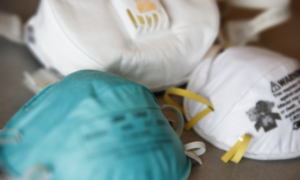IPR VIOLATIONS ARE ILLICIT TRADE:
The IPR Center’s Battle
Michael Rose
Supervisory Special Agent, Homeland Security Investigations
Section Chief, National IPR Coordination Center*
Homeland Security Investigations (HSI) is the primary investigative agency within the Department of Homeland Security. HSI’s broad legal authority to enforce customs laws makes the agency the preeminent tool in the U.S. government’s fight against all illicit trade, from importation of counterfeit goods, to narcotics smuggling and human trafficking. One of HSI’s key roles in combatting illicit trade is leading the National Intellectual Property Rights Center (IPR) Center: a taskforce of U.S. federal law enforcement, international law enforcement, industry, and academia.
The efforts of the IPR Center run the gamut. They range from coordinating the seizure of counterfeit personal protective equipment (PPE) at ports of entry around the world; to seizing websites hosting pirated movies and music; to investigating the sale of infringing goods on e-commerce platforms. Intellectual property rights enforcement is a multi-front battle, and the IPR Center is leading the charge.

During the early days of COVID-19, criminal organizations looked for innovative ways to exploit the pandemic for financial gain. Identifying these emerging threats, the IPR Center leaned on existing relationships with industry and law enforcement partners to identify and seize counterfeit PPE destined for front line medial workers. When fraudulent vaccination cards began streaming into the country from China, the IPR Center collaborated with our law enforcement partners—both in the U.S. and abroad—to seize them at ports of entry and shut down the vendors who were selling them.
Recently, the IPR Center has had success in dealing with another type of illicit trade—digital piracy. Based on an HSI investigation, a prolific hacker was extradited to the U.S. and pleaded guilty to building and selling tens of millions of dollars’ worth of devices that allowed users to hack video gaming systems. After hacking the systems, the users were able to play pirated versions of copyrighted games without any compensation to the rightful creators.
In another HSI-led investigation, the leader of a piracy group pleaded guilty for his role in selling access to movies and television shows prior to their retail release date, including nearly every movie released by major production studios, infringing on the material and compromising the content’s copyright protections. This scheme cost production studios many millions of dollars in lost revenue.
As the role of e-commerce in the lives of Americans continues to expand, the IPR Center has partnered with several of the largest e-commerce platforms to root out counterfeit goods. The main tenet of the plan is to enhance information sharing among competing platforms and with law enforcement. By comparing data, platforms can help each other identify potential sellers of counterfeits, and law enforcement can better target the most egregious violators.
In 2020, DHS recommended the formation of the Anti-Counterfeiting Consortium to Identify Online Nefarious Actors (ACTION) See the March, 2020 edition of the BPP’s Policy Update: A Time for Action to integrate shippers and payment processors into the fight against counterfeits on e-commerce. The IPR Center leads the effort, which has resulted in e-commerce companies removing bad actors from their platforms and actionable law enforcement leads for criminal investigations.

The key thread that ties every intellectual property crime together is financial gain. IP crimes are low risk and high reward for criminals. For those selling access to stolen movies, music, or software, the only investment may be the purchase of a computer and Internet service. But the returns can be in the millions of dollars. Counterfeit goods such as sneakers can be made cheaply overseas and sold in the U.S. for hundreds of dollars per pair. While federal law dictates a sentence of up to 10 years in prison and a $2 million fine for trafficking in counterfeit goods, rarely are sentences that severe.
Much of the work done by the IPR Center goes unnoticed by the public. But we are working to spread awareness through our partnerships. One of our key partners is Michigan State University’s Center for Anti-Counterfeiting and Product Protection. The IP Protect program, led by A-CAPP in conjunction with the IPR Center, provides small and medium sized business the resources they need to protect themselves from IP theft. As part of the program, the IPR Center and HSI offices offer outreach to businesses, educating them on the threats and the support that’s available to protect themselves. The fight against illicit trade will continue, with HSI and the IPR Center at the forefront.
*Michael Rose as a Supervisory Special Agent with Homeland Security Investigations. Mr. Rose leads a team of investigators at the IPR Center which operates as a taskforce with 28 partner organizations that includes U.S. and foreign law enforcement, industry, and academia. Mr. Rose received his B.A. in Journalism from Michigan State University.
THE BRAND PROTECTION PROFESSIONAL | MARCH 2022 | VOLUME 7 NUMBER 1
2022 COPYRIGHT MICHIGAN STATE UNIVERSITY BOARD OF TRUSTEES
- Next…
